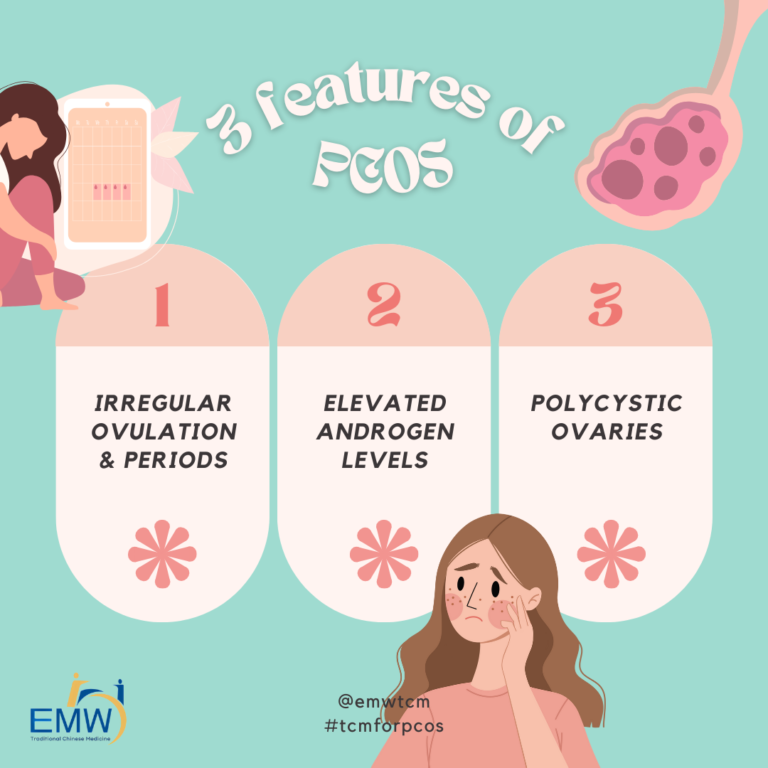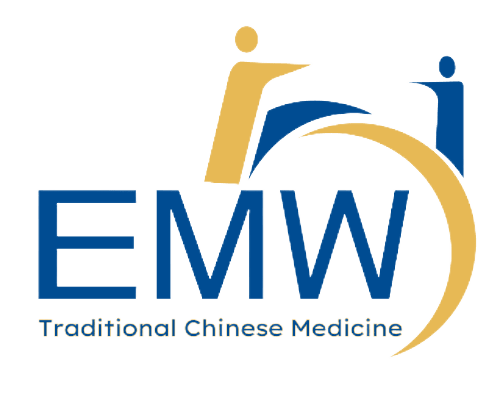TCM and PCOS
Polycystic ovary syndrome (PCOS) is a complex condition characterized by elevated androgen levels, menstrual irregularities, and/or small cysts on one or both ovaries. Alternative medicine such as Traditional Chinese Medicine(TCM) have been shown to be effective in treating women with PCOS to successful conception.
The term polycystic ovaries refers to ovaries that contain 10 or more immature follicles with a maximum 9 mm diameter and whose central connective tissue is increased. Under ultrasound, multiple antral follicles— without a dominant follicle—and, as a whole, clearly enlarged ovaries are detected. The follicles fail to mature into a tertiary follicle ready for ovulation. Ovulation fails to take place and menstrual periods are accordingly irregular or absent.
Three main features generally characterise PCOS:
• Irregular periods. The ovaries do not ovulate regularly.
• Elevated androgen levels. The ovaries produce more “male” hormones than normal, which may lead to physical signs such as excessive hair growth.
• Polycystic ovaries. The ovaries contain at least 12 follicles.
If you have 2 or more of these features, you may be diagnosed with PCOS. However, it is difficult to know for certain how many women have PCOS because many of them may not have any symptoms.

What are the symptoms of PCOS?
Usually PCOS patients present with the following:
● enlarged ovaries with numerous small cysts,
● irregular menstrual cycles,
● increased body hair in a typical male pattern (hirsutism)
● obesity
● sterility
● changes in the fat and carbohydrate metabolism (insulin resistance)
● acne
● hair loss
What are the treatment options for PCOS?
There is no known cure for PCOS, unfortunately, and it is a long-term condition that does not go away on its own. However, symptoms can be managed and some of the medical conditions that co-occur with PCOS, such as infertility and obesity, should be treated regardless of PCOS diagnosis. Long-term management of PCOS is very important as many women with PCOS continue to have high levels of androgens and insulin resistance even after menopause, leading to lifelong health risks such as type 2 diabetes and cardiovascular disease.
• Lifestyle interventions. It is considered the first management step as obesity worsens the presentation of the symptoms of PCOS. It consists of changes in diet, exercise and behavioural interventions designed to improve weight.
• Medical interventions. Combined contraceptives (COCs) are effective at restoring normal hormone balance, regulating ovulation/menstrual cycle, alleviating symptoms like excess hair growth and acne, and preventing endometrial cancer. Metformin (insulin-sensitising agent), when used in conjunction with COCs and/or lifestyle changes, has been shown to improve menstrual cycles, hyperandrogenism, as well as insulin resistance, particularly in overweight or obese women with PCOS. Letrozole and clomiphene citrate (Clomid) are used to induce ovulation in PCOS patients to improve reproductive outcomes.
• Surgical interventions. Surgical interventions can sometimes alleviate PCOS symptoms. Laparoscopic ovarian drilling may be a viable treatment option for patients with PCOS-related fertility issues who do not respond to medication.
• Assisted reproductive technology (ART). ART, primarily in-vitro fertilisation (IVF) and intracytoplasmic sperm injection (ICSI), can play a role in PCOS if patients have failed to respond to ovulation induction medications or if there are other indications such as tubal blockage or male factor infertility.
How does PCOS affect fertility?
Women with PCOS experience fertility problems because they do not release an egg, or ovulate, regularly but TCM has shown to be quite effective in rectifying this issue. Without regular ovulation, periods become irregular. It is hard for them to know when they are ovulating, it is hard to time intercourse, and all this will decrease the chances of getting pregnant.
Imbalances in reproductive hormones such as oestrogen, progesterone, follicle-stimulating hormone (FSH) and luteinising hormone (LH) can have a negative impact on ovulation. In PCOS women, it is typical to have an elevated level of androgens, along with an elevated LH to FSH ratio. These hormonal imbalances cause follicles to develop too quickly and then shut down prematurely before they can produce eggs or eggs of good quality, making it harder to get pregnant or may lead to miscarriage.

EMW-TCM PCOS Management
For both Western and Chinese medicine, the first line of treatment is diet and weight control. The goal is to regulate the blood sugar, decrease insulin resistance and improve glucose metabolism to stabilize mood and weight. With some women, reducing insulin levels and improving insulin sensitivity through weight loss, a low glycemic diet and exercise may restore normal ovulation.
TCM approach treats underlying imbalances causing hormonal irregularities to correct the problem and the symptoms together.
For any treatment option, make sure to stick with your game plan since results can take a few months to appear. You’ll notice that cycles become more regular, indicated by mid-month vaginal discharge and elevated temperatures. Eventually, you’ll also see weight reduction and lesser abnormal hair growth.
After definite diagnosis, we will have to diagnose your body constitution through a detailed TCM assessment. Not all PCOS patients are diagnosed with Kidney Deficiency or Dampness Body Constitution. Every individual is different, therefore every treatment approach is individualised.
After which, you may need chinese herbal medication, acupuncture and a customised diet/exercise plan.

Diet & Lifestyle Tips

- Eat regularly. Regular meal times or eating every 3 to 4 hours stabilises blood sugar levels and promotes weight loss.
- Choose low glycemic index (GI) carbohydrates and whole grains. GI is a scale that measures how quickly carbohydrate-containing foods raise blood glucose levels. Low GI foods are broken down more slowly and cause a gradual rise in blood sugar levels. They can curb blood sugar spikes, reduce insulin resistance and lower the risk of diabetes. Low GI carbs and whole grains include barley, buckwheat, black rice, rolled oats, bulgur, rye, quinoa, and legumes (black beans, red beans, mung beans, chickpeas, yellow lentils, etc).
- Have balanced meals. Balance each of your meals by including protein-rich foods (meat, fish, eggs, beans, pulses, tofu, nuts and seeds), healthy fats (olive oil, nuts and seeds, rapeseed oil, and avocados), and low GI fruits (citrus, berries, apples, pears, etc) or non-starchy vegetables (carrots, mushrooms, onions, aubergine, radish, etc), in addition to low GI carbs. This helps you stay fuller for a longer period and suppresses cravings.
- Include leafy greens. Include 2 servings of leafy greens every day. Leafy greens contain indole-3 carbinol (I3C), which helps to regulate liver function which is essential for the metabolism of hormones and glucose. Leafy greens include kale, broccoli, lettuce, bok choy, cabbage, etc.
- Include omega-3 fats. Omega-3 fats help lower inflammation responses in the body which are commonly seen in those with PCOS. Omega-3 fats-rich foods include walnuts, chia and flaxseeds, seaweed, algae, soybean oil, salmon, mackerel, etc.
Avoid:
- Refined carbohydrates. Refined carbs impair glucose metabolism. They have a high GI and are digested quickly, leading to rapid spikes in blood sugar and insulin levels after meals. Refined carbs include white sugars, white flour, whole wheat flour and products made from them (pasta, bread, desserts, etc).
- Milk and dairy products. They are considered damp and phlegm-producing foods according to TCM theory. The same goes for cold and raw drinks and foods (yes, too many salads are bad for you!), greasy and fried foods, processed carbs and sugars, and alcohol. They impair the function of the Spleen and may exacerbate the symptoms of PCOS.
- Sodas, fruit juice and energy drinks. They raise blood glucose levels rapidly, leading to tiredness and increased hunger, contributing to increased weight gain.

References
[1] Chen BY, Yu J. Relationship between blood radioimmunoreactive beta-endorphin and hand skin temperature during the electro-acupuncture induction of ovulation. Acupunct Electrother Res 16: 1–5, 1991.
[2] Xiaoming MO, Ding LI, Yunxing PU, Guifang XI, Xiuzhen LE, Zhimin FU. Clinical studies on the mechanism for acupuncture stimulation of ovulation. J Trad Chinese Med 13: 115–119, 1993.
[3] Jedel, E., Labrie, F., Odén, A., Holm, G., Nilsson, L., Janson, P. O., Lind, A. K., Ohlsson, C., & Stener-Victorin, E. (2011). Impact of electro-acupuncture and physical exercise on hyperandrogenism and oligo/amenorrhea in women with polycystic ovary syndrome: a randomized controlled trial. American journal of physiology. Endocrinology and metabolism, 300(1), E37–E45.
[4] Moini Jazani, Arezoo & Hamdi, Kobra & Tansaz, Mojgan & Nazemiyeh, Hossein & Sadeghi-Bazargani, Homayoun & Fazljou, Seyed & nasimii doost azgomi, Ramin. (2018). Herbal Medicine for Oligomenorrhea and Amenorrhea: A Systematic Review of Ancient and Conventional Medicine. BioMed Research International. 2018. 1-22.
[5] Kwon, C. Y., Lee, B., & Park, K. S. (2018). Oriental herbal medicine and moxibustion for polycystic ovary syndrome: A meta-analysis. Medicine, 97(43), e12942.
Our TCM Physicians
Principal TCM Physician
- M.Med(TCM Gynaecology)
- B.Sc(Hons) Biomedical Sciences
- Dip. Naturopath
- Ayurvedic Therapist(500hrs)
- Registered TCM Physician (Singapore MOH)
Senior TCM Physician
- M.Med(TCM Acupuncture & Moxibustion)
- B.Sc(Hons) Biomedical Sciences
- Certified Aromatherapist
- Registered TCM Physician (Singapore MOH)
TCM Physician
- M.Med(TCM Gynaecology)
- B.Sc(Hons) Biomedical Sciences
- Registered TCM Physician (Singapore MOH)
TCM Physician
- B.Med(TCM)
- B.Sc(Hons) Biomedical Sciences
- International Board-Certified Lactation Consultant (IBCLC)
- Registered TCM Physician (Singapore MOH)





